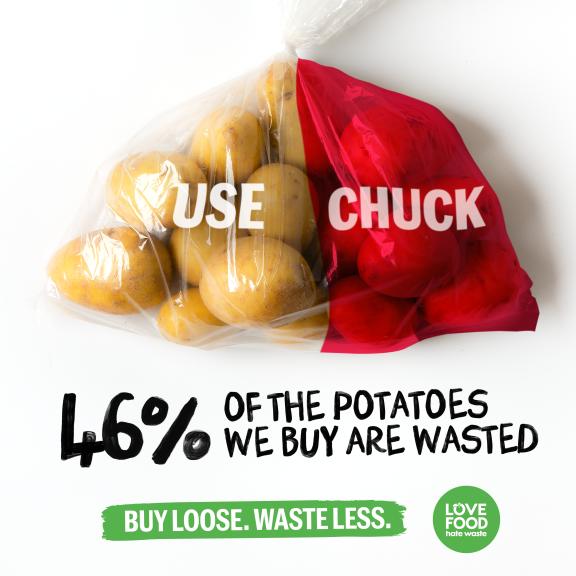From 31 March 2026 every Council in England will be collecting food waste each week from households. This is a new legal requirement introduced by the Government under Simpler Recycling.

Why are food waste
collections being introduced
In the UK, households unfortunately throw away a lot of food waste. Currently, 60% of food waste in the UK is wasted by households. That’s 4.7 million tonnes of food being thrown away every year that could have been eaten.
Wasting food not only costs financially, but wastes energy used in the production, processing, packaging and transporting of food which impacts on the environment and climate change.
Reduce food waste and save money
Preventing food waste is best. In the UK households throwaway around £17 billion of food a year which could have been eaten. The means that an average household spends £600 a year on food that is thrown away.
For advice and handy tips for reducing food waste go to our Love Food Hate Waste information.
Benefits of collecting food waste
Collecting food waste separately helps to:
- Reduce damaging greenhouse gas emissions by removing food waste from black bin waste
- Meet national recycling and circular economy targets
- Reduce waste disposal costs (food waste within the black bin costs a lot more to dispose of compared to recycling food waste)
- Generate a biogas used to make renewable heat and power
- Produce a bio-fertiliser for use in agriculture
When will the food waste collections start?
Food waste collections in Erewash will start from 30 March 2026. Collections will be every week. More information will be provided to households nearer the time.
How will food waste be collected?
Households (who have wheeled bins) will be given a grey kitchen caddy (five litre) and a larger green kerbside caddy (23 litre) which will be emptied by the crew.
The larger green kerbside caddy has a handle which locks the lid to keep the caddy secure.
Households within flats and communal properties will be given a kitchen caddy and may share a bin which will be emptied by the crew.
What food waste will go in the caddies?
- Meal leftovers
- Plate scrapings
- Meat - raw and cooked, bones
- Eggs including eggshells
- Dairy products like cheese and yogurts
- Bread, cakes and other baked goods
- Pasta and rice
- Beans and pulses
- Fish/shellfish - raw and cooked, including bones and shells
- Fruit - raw and cooked
- Vegetable peelings
- Salad and vegetables - raw and cooked
- Tea bags (including the bag) and coffee grounds
- Lard and other hard fats
- Pet food
What should NOT go in the food waste caddies?
- Packaging of any sort
- Plastic bags or plastic film
- Liquids
- Cardboard
- Foil
- Glass
- Other recycling and waste
- Garden waste
What will happen to the food waste collected?
The food waste will be collected in special vehicles and taken to an anaerobic digestion facility. Here the food waste will be fed into a sealed digestor where it is slowly mixed and the food waste broken down by micro-organisms in the absence of air. This process will produce a biogas used to create heat and power and a bio-fertiliser for use in agriculture.
